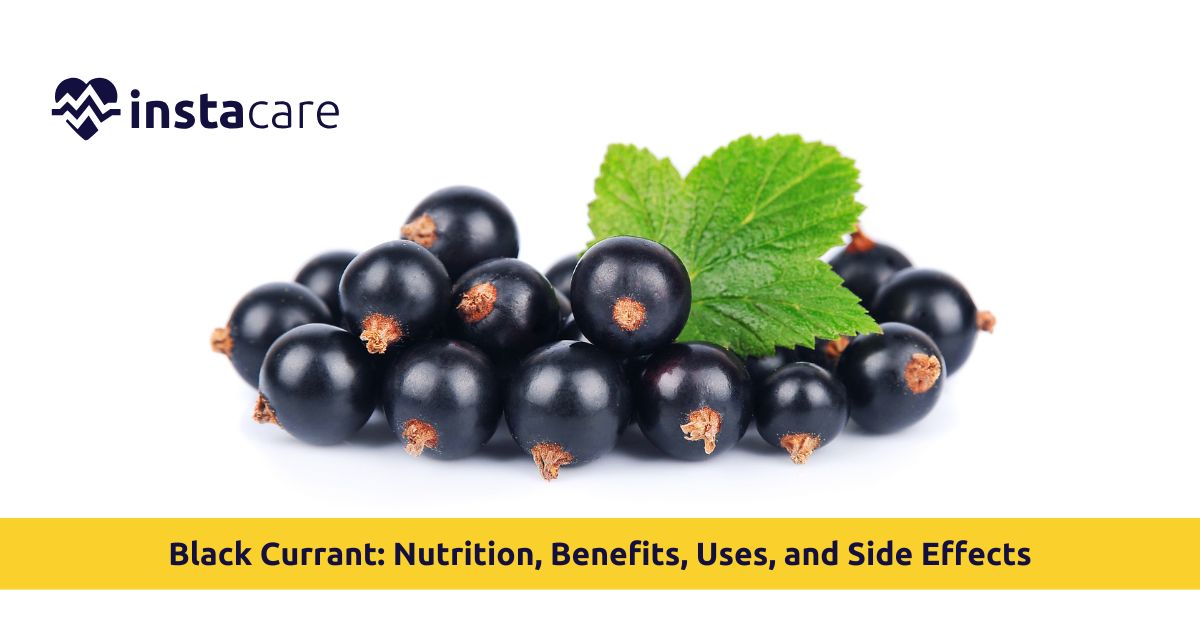However, don’t confuse black currants with blueberries, as they are different fruits. Black currant has a stronger sour grape and lemon-like taste, and they are rich in minerals like Vitamin C, iron, and Fibre. Blueberries, on the other hand, have a sweeter, floral-like taste and are rich in magnesium. In this article, we will give you details about Black Currant, Black Currant benefits, its uses, Black currant nutrition profile, its health benefits, possible side effects, and much more.
What is Black Currant?
Black Currant is a berry-like fruit that has a similar taste to a lemon and apple tart, and it contains seeds. There is a chemical inside Black currant seed oil called gamma-linolenic acid (GLA). Gamma-linolenic acid (GLA) is beneficial for the immune system and helps reduce inflammation and swelling. Black Currant itself comes with a chemical called anthocyanin, which has an antioxidant effect. Black Currant is also used to cure High blood pressure, gout, high cholesterol, muscle fatigue, eczema, wound healing, and many other conditions.
Nutritional Profile of Black Currants
Black currant has plenty of minerals and antioxidants that contain several nutrients like gamma-linolenic acid (GLA), polyphenolic substances, and anthocyanin. The Black currant is widely used in the form of Jam and seed oil. However, you can use it to make tea and infusions with it.
Health Benefits of Black Currant
The following are the health benefits of Black Currant.
Beneficial for Heart Health:
Black currants are rich in potassium, which is beneficial in lowering your blood pressure. Some research indicates that it is very beneficial for reducing the risk of heart disease, but more research is required to prove this fact.
Beneficial for Joints and Muscles:
Black currant seeds have gamma-linolenic acid (GLA), an omega-6 kind of fatty acid that has anti-inflammatory abilities. The high gamma-linolenic acid (GLA) helps in reducing joint and muscle pain. Also, it cures muscle stiffness, soreness, and damaged muscles. However, if you have severe pain, then it is recommended to consult a doctor.
Boost the immune system:
Along with Vitamin C, Black Currants are rich in antioxidants like anthocyanins. The antioxidants may have the ability to boost your immune system and cure diseases like the flu and sore throat.
Help with Dry eyes:
Studies show that black currants have gamma-linolenic acid (GLA), which helps treat dry eye diseases and is beneficial for improving overall vision.
Culinary and Medicinal Uses of Black Currants
Just like blueberries and grapes, black currants are also used in many culinary items. The most common forms of black currants are Jams, juices, liquor, and as an ingredient in desserts and baked food items. Below are the culinary and medicinal uses of black currant.
Culinary uses of black currants:
- Beverages: It is used in processed juices, alcohols, and teas.
- Jams: The black currants are used in making different types of jams and puddings.
- Savory Dishes: It is also used in making different sauces and can be used in different food items.
Medicinal uses of Black Currants:
- Cardiovascular Health: The antioxidants in black currants help lower blood pressure and improve blood flow.
- Immune System: The Vitamin C and antioxidants in black currants are beneficial in boosting the immune system.
- Gut Health: The black currant may increase bacteria in the gut.
Possible Side Effects and Precautions
The black currant is safe to it if taken as a food or as a fruit. However, black currant supplements and seed oil may have shown some side effects like Gas, soft stool, and mild diarrhea. The side effects are because it can slow blood clotting. The supplements are not recommended for people with bleeding disorders.
How to Incorporate Black Currants into Your Diet?
It is not difficult to incorporate black currants into your daily diet. You can use it as a dried fruit, fruit juice, tea, jam, or frozen fruit. Many beverages contain black currant, which you can buy from your nearby store if it is available.
Recommended dosage for black currant is:
- One small glass (150 millilitres) of fruit juice per day
- 30 grams (g) of dried black currants
- 80g of fresh or frozen black currants
Conclusion:
In this article, we discuss in detail about black currant. Black currants are berry-like fruits with a strong sour grape and lemon-like taste, but it is different from blueberries. Blueberries and black currants are two different fruits. As black currants are rich in minerals, vitamin C, and antioxidants, it is very helpful in many ways. It is beneficial for the heart, blood flow, immune system, and dry eyes. It can be used in many forms, such as jams, jellies, juices, beverages, and food items.
Please book an appointment with the best Nutritionist in Lahore, Karachi, Islamabad, and all major cities of Pakistan through InstaCare, or call our helpline at 03171777509 to find a verified doctor for your disease.

